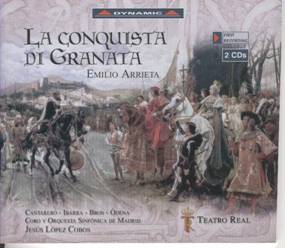Dynamic 618/1-2

Emilio Arrieta: La Conquesta di Granata
Dynamic 618/1-2

Chris Webber on his magnificent zarzuela site discarded this recording. He was a bit disillusioned that the Teatro Real had not exhumed one of the composer’s later zarzuela’s instead of performing this youthful opera. Arrieta nowadays is mostly known by his masterpiece Marina which he reworked somewhat, eliminating all dialogues so that it could be performed as an opera (though the later Alfredo Kraus-EMI recording is a fine one should really listen to the tenor’s first version, recorded late fifties, early sixties. Stunning vocalism). Now if Webber thinks Arrieta’s unknown zarzuelas are musically far more rewarding than this La Conquista di Granata, they must be incredibly fine as the opera under review is already such a good listen. Of course, young Arrieta worked with a libretto writer who knew all the tricks of bel canto opera: Temistocle Solera of Nabucco fame. He knows all the ins and outs of romantic tragedy though even he cannot completely overcome some inbuilt problems. On first sight the opera is a tribute to the legendary queen Isabella of Castille who married king Ferdinand of Aragon; thereby creating a dual monarchy that in the 19th century became modern Spain (up to then Spain was only a geographical entity). But the real reason behind this opera is a tribute to Isabella II, queen of Spain in Arrieta’s time. Therefore Solera could only produce the first Isabella as a paragon of virtue at the time of the conquest of Granada when the colonial muslim rulers were finally thrown out from the peninsula. He couldn’t give her lovers or have her kill adversaries as this would have been an insult to the reigning queen Isabella. The mezzo singing the historical queen has of course a big aria but for the rest the role is secondary and Solera turns back to the well known cliché of his time: muslims loving Christians and converting. This may sound not too convincing but obviously Arrieta was inspired enough to write a good score.
Arrieta is above all a fine tune smith. He knows to write an aria that develops and finishes with a climax and he has already learned how to build an ensemble. Indeed there are reminiscences of late Donizetti and young Verdi. But what is wrong with that ? On the contrary the veteran collector is by now looking for these kind of scores: sing-able, melodious and at last something else than his beloved Verdi, Bellini or Donizetti. In the past Bongiovanni and Opera Rara succeeded often in recording operas by lesser luminaries like Rossi, Persiani, Ricci, Marchetti etc. but they often had a heavy handicap: the refusal of top or even very good singers to learn just a score for a concert performance that could be recorded and so these interesting labels had to do with singers who couldn’t deliver the score as it ought to be. That is a marked difference with the recording under review. Jesus Lopez Cobos is a top conductor at the helm of te Madriline Orquesta and Chorus and he clearly believes in this opera; illuminating its beauties, driving it along while still giving solo singers leeway to indulge in a few top notes. It is a pity however cabalettas are sung only once and not twice as was the rule of the time. Tenor José Bros, once a comprimario to Alfredo Kraus, has now succeeded his former mentor, indeed somewhat resembling him in vocal colour and he has developed into a good lyric tenor with a fine top. Maria Cantarrero, a name up to now unknown to me, has an interesting lyric warm and passionate voice with good coloratura. Ana Ibarra has a warm enveloping sound in her Isabella-scene. Alastair Miles has a lot of experience with belcanto-operas due to his connection with Opera Rara but still I think the voice too bland, not personal enough. All in all every opera buff would do well to invest in this recording instead of purchasing his 12th copy of Madama Butterfly.
Jan Neckers